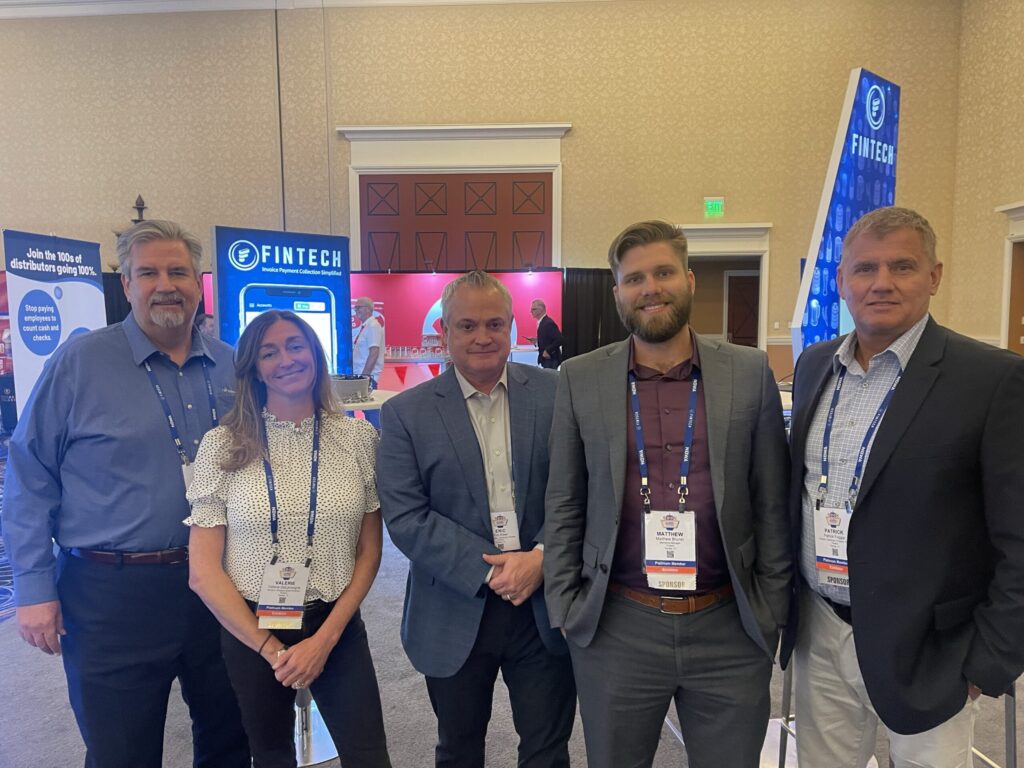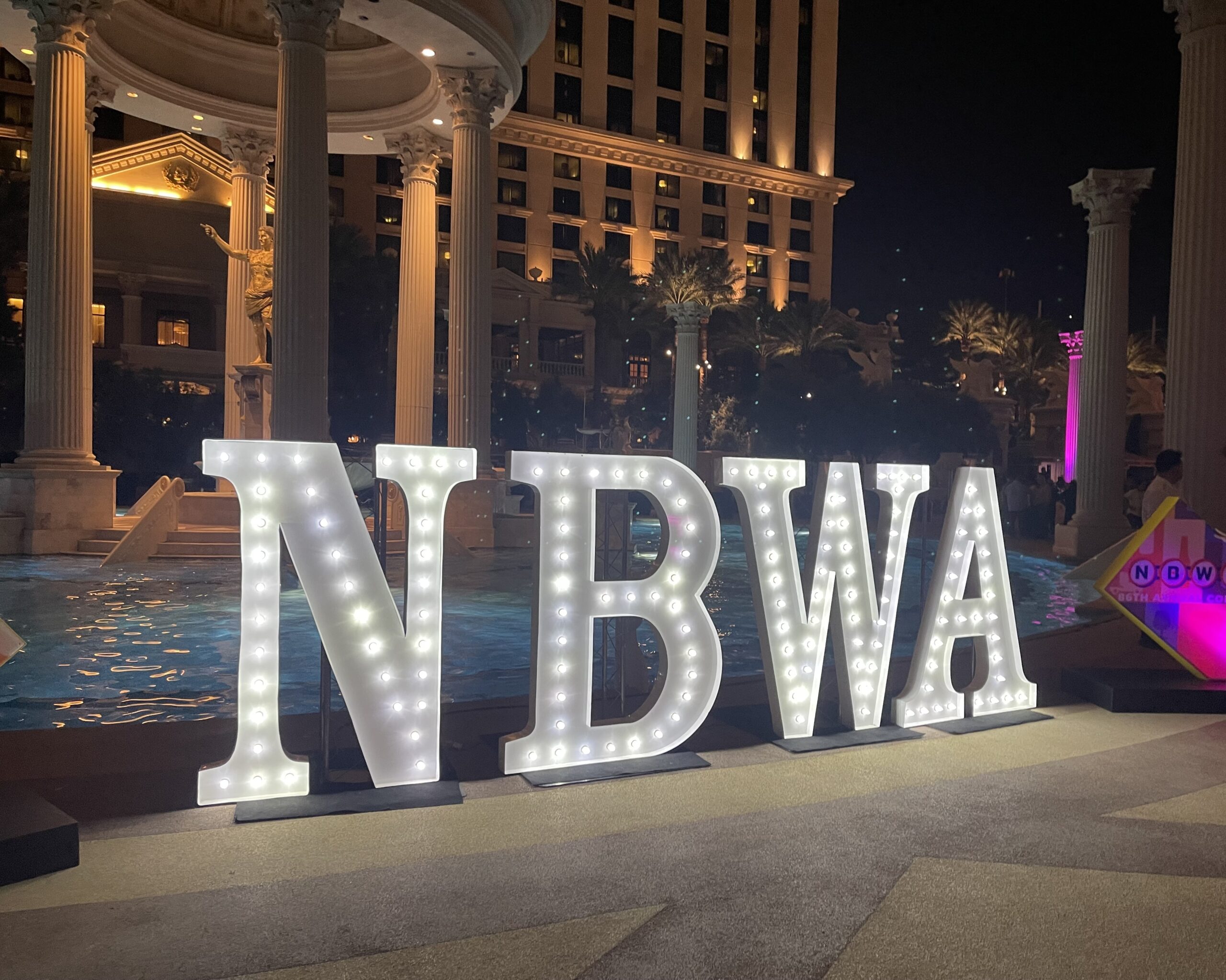This last week was the National Beer Wholesalers Association’s (NBWA) 86th Annual Convention & Trade Show in Las Vegas, Nevada. This meeting “provides valuable education programs for the beer industry and introduces distributors to new products, technologies, and vendors needed to run their operations.” Over 200 companies gathered to present the newest beverages and solutions to help distributors scale their businesses. As a proud Platinum Sponsor of the event, Fintech had a booth on the Trade Show Floor and showcased new ways we can bring value to distributors.

A Focus on Unity and Support
Outgoing NBWA Chairman Gordon Green kicked off the convention’s General Session with an emphasis on unification across the distributing industry.
“When we enter this room, we leave our brand hats at the door and we unite and come together as an industry,” said Green. “If our competitor is struggling or facing challenges today, that can be any one of us tomorrow. We are all affected one way or another by the changing market, the diminishing consumer loyalty, and the actions of our suppliers.”
He also spoke of the NBWA’s support and dedication to wholesalers nationwide. NBWA’s advocacy team fights for tax certainty for mainstream businesses so distributors can run and grow their operations with confidence. Its PAC raised over $1.7 million from nearly 650 contributors to support legislation that maintains the three-tier system.
It is a particularly active time in alcohol litigation. The NBWA monitors all relative cases and will directly engage if needed to preserve investments, provide certainty in distributor business operations, and navigate the ongoing supplier-distributor relationship.
Green also highlighted the resources NBWA provides to help inform businesses with industry-specific data. For example, the Beer Serves America report, co-opted by NBWA and The Beer Institute, which provides data on job creation and the economic impact of the beer industry. This data and the support of the Center for Alcohol Policy help educate lawmakers and the public on effective state-based regulation.
The rise of non-alcohol (NAs) beverages and ready-to-drink (RTD) options are significant, not to mention soft drink giants entering the bev alc space, but Green noted that the NBWA will continue to push for fairness, collaboration, and equity.
“I am excited to see what comes next for this incredible industry. And I know that whatever changes and challenges come, we will meet the moment as we always have – with adaptability, with resilience, and with perseverance to grow our industry and become stronger than ever before,” said Green.
Finding the Balance Between Diversification and Preservation
NAs and RTDs present an opportunity for distributors to diversify their portfolios. That being said, the preservation of the beer category is of the utmost importance to the NBWA. Craig Purser, NBWA President and CEO, presented data on the changing preferences of legal drinking age (LDAs) consumers. While beer continues to be America’s favorite alcohol beverage, he noted the margin is shrinking. More importantly, there has been a significant increase in the percentage of consumers under 35 who are abstaining from alcohol altogether.
Purser spoke on how suppliers can help with efforts to make beer more appealing to young adults and a broader customer base. These efforts should include balancing the expectations and values of existing consumers while making more room at the bar for new customers. Distributors also have a role to play in appealing to a wider market.
“We must make sure that we are helping distributors be more responsive to the broader growth and expansion of the beverage category. We need to invest in our people, and we need to work to make our industry more reflective of the next generation of consumers. In short, we must be able to walk and chew gum at the same time, because the competition is moving fast and moving hard,” said Purser.
There were also remarks on new initiatives to help boost the beer category and sell more beer. Outside of appealing to LDAs with next-generation leaders, the beer industry can do more to market to female consumers (who make up 51.5% of the population) and be more inclusive of Black and other POC-brewers.
Kevin Johnson, former NBA All-Star and co-founder of the National Black Brewers Association (NB2A), had a discussion with David Steinman from Beer Marketer’s Insights in which they noted the importance of bringing Black-owned businesses into the fold.
“This is a $77 billion industry, but only 2% of staff are African American in the space, which is very low. And then in terms of craft brewers, there are 10,000 craft breweries around the country and less than 1% are owned by African Americans. So, our purpose is to promote the interests of Black brewers, increase the ownership of Black brewers, increase our role around policy and be a part of the legislation that the NBWA advocates for on a regular basis, and be a one-stop for education, counsel, and workforce development for Black brewers in this country,” said Johnson.
An Evolving Economy
Lester Jones (NBWA Vice President, Analytics and Chief Economist) spoke on the current state of the economy. While the economy isn’t back to where it should be for optimal growth, Jones noted that real income is still strong, spending is still good, overall debt is manageable, and jobs are coming back – to the tune of 1.6 million new jobs added in 2023. Overall, things are trending in the right direction for a more sustainable economy.
“When you look at how much alcohol we drink over the last couple of years, you will see that it’s very predictable in terms of the total alcohol/ethanol per capita consumption. The shares will change – where we drink, how we drink – and that is where we have to stay focused on,” said Jones.
Jones noted the rise in news stories on how consumers are moving away from drinking, but he said the data says otherwise. It is true that the beer industry lost a segment of drinkers, but the magnitude of the market is still there to succeed. The occasion-based nature of the business still presents revenue spikes with holidays, The Super Bowl, and other big-ticket events. And consumers want to spend money and be out in the world compared to the last few years.
Regarding demographics, Jones noted the importance of the transfer of knowledge and wealth to the newer generations. This transfer will spurn the beer industry in terms of labor, productivity, and overall success.
NBWA Grows With New Leadership
The end of the conference saw Michigan’s Jim Fabiano II (Fabiano Brothers) named as the new Chairman of the Board for NBWA. Fabiano brings a wealth of experience to the position and is committed to continuing to advocate for beer distributors.
“I’m honored to be your new Chairman, representing America’s 3,000 independent beer and beverage distributors. Every day, this industry moves mountains. 140,000 men and women working from before dawn until after sunset to keep shelves stocked, taps flowing, and coolers full in every small town and big city. The livelihoods of so many of our neighbors rely on the extraordinary efforts of distributors – and we always come through,” said Fabiano. “My promise to you is that I will match that level of effort as your chairman.”
For more information about NBWA’s 86th Annual Convention & Trade Show, visit their website here.






